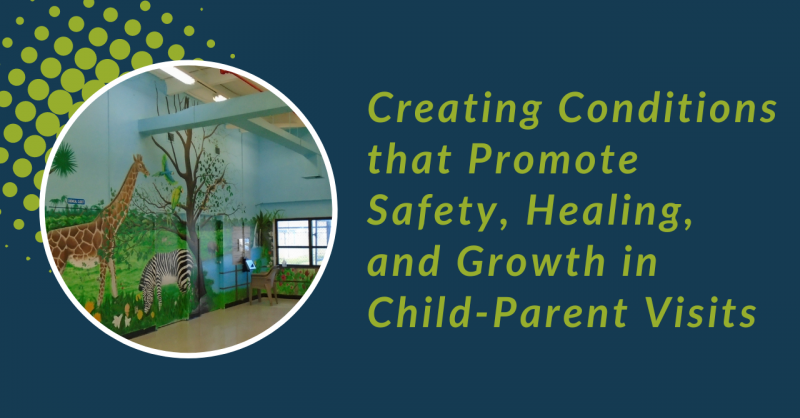Youth who receive special education services under the Individuals with Disabilities Education Act (IDEA 2004) and especially young adults of transition age, should be involved in planning for life after high school as early as possible and no later than age 16. Transition services should stem from the individual youth’s needs and strengths, ensuring that planning takes into account his or her interests, preferences, and desires for the future.
Children of Incarcerated Parents: Presentations
The Benefits and Importance of Using YPAR with Youth with Incarcerated Parents
On September 21, 2020, the Federal Interagency Working Group on Youth Programs hosted the webinar, The Benefits and Importance of Using YPAR with Youth with Incarcerated Parents. Youth Participatory Action Research (YPAR) is an approach in which researchers engage youth as full partners in the research process. The approach teaches valuable skills while answering questions about topics youth deem critical. Research data and findings may be applied to policy and practice. This webinar discusses the variety of roles youth may hold and the importance of leveraging developmental relationships while conducting YPAR. Hear directly from a youth about her experiences with YPAR. This webinar is especially useful for researchers who conduct YPAR working with youth who have or have had an incarcerated parent.
Watch the webinar recording and download the slides (PDF, 39 pages):
Safeguarding Children of Arrested Parents: Implementing the Model Arrest Policy
On May 15, 2019, the Federal Interagency Working Group on Youth Programs, the International Association of Chiefs of Police and the American Institutes for Research hosted the webinar, Safeguarding Children of Arrested Parents: Implementing the Model Arrest Policy. This 90-minute live webinar highlighted the Model Arrest Policy implementation and is recommended for law enforcement staff, probation officers, social services staff, youth serving organizations, and researchers. The purpose of this webinar was:
- To highlight how a locality has instituted the International Association of Chiefs of Police (IACP) model arrest policy through collaborations (e.g., between non-profit organizations and government agencies) to protect children of arrested parents.
- To share the experiences of a youth who has witnessed the arrest of her parent.
- To highlight research on the impact a parent’s arrest has on children, especially those who have witnessed the arrest.
Watch the webinar recording:
Listen to a follow-up interview with the youth presenter:
- Download the presentation slides (PDF, 36 pages).
- Download the transcript (PDF, 27 pages).
- Download the Q & A session (PDF, 4 pates).
Educators are Critical Partners in Making A Difference in the Lives of Children of Incarcerated Parents
On September 24, 2015, the Federal Interagency Reentry Council (FIRC) Subcommittee on Children of Incarcerated Parents and the American Institutes for Research hosted the webinar, Educators are Critical Partners in Making A Difference in the Lives of Children of Incarcerated Parents. This presentation and Q&A session provided the audience with statistics on the prevalence of children with incarcerated parents, practical tips for addressing the needs of these children and youth, and how to use collaboration, focused assistance, and advocacy to contribute to positive outcomes for children who have an incarcerated parent. Presenters included nationally-recognized experts, educators who are currently addressing the needs of children of incarcerate parents, and a youth whose parent is incarcerated:
- Ann Adalist-Estrin — Director, National Resource Center on Children and Families of the Incarcerated
- David Osher — Vice President and Institute Fellow, American Institutes for Research
- Dwight Davis — Assistant Principal, Turnaround for Children Partner School
- Kendall T. — U.S. Dream Academy Graduate
- Download the speaker biographies (PDF, 5 pages).
Watch the webinar recording:
- Download the presentation slides (PDF, 60 pages).
- Download the transcript (PDF, 20 pages).
» Learn more about Children of Incarcerated Parents at youth.gov/COIP.
» Join the Children of Incarcerated Parents listserv.
Announcements
Collaboration Profiles
Feature Articles
Resources
Technical Assistance
Tools & Guides
Videos & Podcasts
Webinars & Presentations
Websites
Youth Topics
Research links early leadership with increased self-efficacy and suggests that leadership can help youth to develop decision making and interpersonal skills that support successes in the workforce and adulthood. In addition, young leaders tend to be more involved in their communities, and have lower dropout rates than their peers. Youth leaders also show considerable benefits for their communities, providing valuable insight into the needs and interests of young people
Statistics reflecting the number of youth suffering from mental health, substance abuse, and co-occurring disorders highlight the necessity for schools, families, support staff, and communities to work together to develop targeted, coordinated, and comprehensive transition plans for young people with a history of mental health needs and/or substance abuse.
Nearly 30,000 youth aged out of foster care in Fiscal Year 2009, which represents nine percent of the young people involved in the foster care system that year. This transition can be challenging for youth, especially youth who have grown up in the child welfare system.
Research has demonstrated that as many as one in five children/youth have a diagnosable mental health disorder. Read about how coordination between public service agencies can improve treatment for these youth.
Civic engagement has the potential to empower young adults, increase their self-determination, and give them the skills and self-confidence they need to enter the workforce. Read about one youth’s experience in AmeriCorps National Civilian Community Corps (NCCC).










